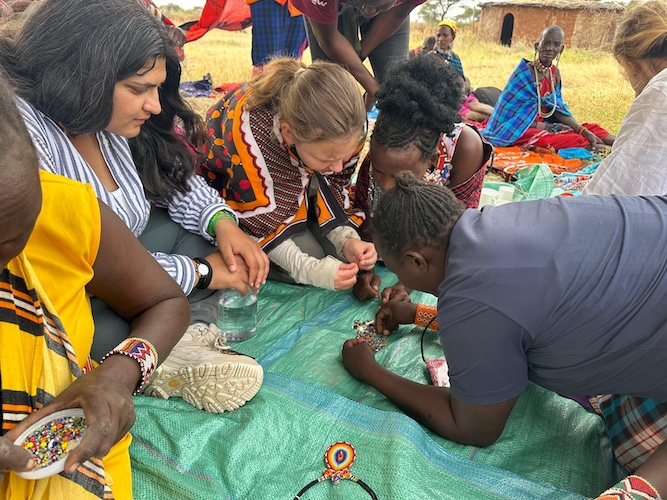Entrepreneurial Approaches to Conservation: Lessons From Maasai Women in Kenya
W&M students work with Kenyan conservation groups and Maasai women to sustain the economy and protect the environment
May 19, 2025
By
Jackson Maynard ’25
Frequent droughts in southern Kenya have threatened the livelihood of the Maasai communities, whose people are pastoralists and stewards of one of the world’s most biodiverse ecosystems.
Through a collaboration with William & Mary’s Entrepreneurship Hub and the Amboseli Ecosystem Trust in Kenya, students at W&M’s Institute for Integrative Conservation (IIC) are learning from Maasai women about how they are leading businesses designed to both promote conservation and support economic health in the face of environmental change. Learning from and engaging Maasai women entrepreneurs in conservation and business is particularly important because women play key roles in managing their households, stewarding resources and caring for children.

During the summer of 2024, a team of William & Mary and Kenyan students collected information about the ways in which conservation organizations and groups of Maasai women are co-designing businesses that balance their livelihood goals with conservation, including initiatives such as ecotourism, cultivating home gardens, managing grass seed banks and producing beaded jewelry and apparel for sale. The intended impact is to generate profits for the women and their families as well as sustained environmental benefits through practices like rainwater harvesting, restored rangelands and improved milk production.
One of the main ways that conservation organizations such as the Amboseli Ecosystem Trust (AET) support these women-led, conservation-oriented endeavors is by equipping the women with the entrepreneurial skills they need to enhance their initiatives. This is where the W&M student research project fits in. With support from the Entrepreneurship Hub, the student team shadowed the women’s collectives and interviewed Maasai women about some of the entrepreneurial training they are seeking and ways that their businesses can best support their goals.
As Sydney Hintz ’26 explains, the goal of the project is to ensure the women have the tools they need to make their businesses sustainable and profitable enough so that “the money that’s earned by the women in the collective stays within the collective.”
Faculty project advisors Graham Henshaw, clinical associate professor at William & Mary’s Raymond A. Mason School of Business and assistant provost for entrepreneurship, and Troy Wiipongwii, the IIC’s director of innovation and entrepreneurship in conservation, work with students to identify root problems and find solutions. Henshaw says the Kenya project encapsulates how William & Mary combines multiple disciplines to solve global problems.
Student participant Asha Nair ’27 agrees: “You can’t just study environmentalism without studying business or studying people.” She describes the research as complex, involving numerous stakeholders and organizations.
Along with Nair and Hintz, Aggie Rigo Saitta ’25 was part of the project team last summer. This year, the project continues with Emma Hugo ’26, Skylar Hartgerink ’27 and Sharanya Dutt ’28.
A double major in public policy and environmental science, Nair says working with the Maasai women and conservation partners provided a foundation for research she plans to continue at William & Mary as she pursues a career in international environmental policy.
Meanwhile, memories of Kenya stay with her. Among those, Nair recalls the camaraderie William & Mary students developed while playing volleyball with partners from AET.
“It was awesome to see the community they have there and how it is so different from the United States, especially corporate America where you go home at the end of the day,” she says. “In Kenya, everyone is friendly to each other and takes time out of their day to get to know each other and spend time together.”